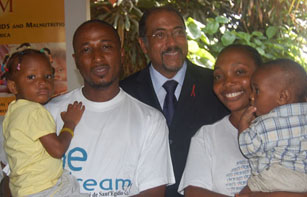
While touring the DREAM project in Conakry, UNAIDS Executive Director Michel Sidibé (centre) met an HIV-positive couple who gave birth to two HIV-negative babies. Photo credit: Mamadou Cellou Diallo/UNAIDS
President Alpha Condé and the First Lady, Ms Djene Kaba Condé, will participate in this year’s UN General Assembly High Level Meeting on AIDS. The announcement came during a two-day official visit by UNAIDS Executive Director Michel Sidibé to the West African nation of Guinea Conakry.
The High Level Meeting, from 8-10 June 2011, is widely seen as an important opportunity to revitalize the global AIDS movement and achieve the UNAIDS vision of zero new HIV infections, zero discrimination and zero AIDS-related deaths.
“I commend President Condé for his commitment and leadership on HIV,” said Mr Sidibé, after a meeting with Guinea’s Head of State on Thursday. “His presence at the High Level Meeting will be critical to advancing the AIDS response here in Guinea, and globally,” he added.
Over the past decade, Guinea has made significant strides in its national response to HIV. Between 2001 and 2009, Guinea saw a 25% reduction in its rate of new HIV infections. Coverage of antiretroviral treatment in the country reached 40% in 2009, up from just 3% in 2004. Furthermore, HIV prevalence in Guinea has remained relatively low since 2006, at about 1% of the adult population.
In his discussions with President Condé, the UNAIDS Executive Director underscored the importance of shared responsibility around AIDS funding. “Ninety six per cent of the AIDS treatment in Guinea is currently funded through external sources. This situation is unsustainable,” said Mr Sidibé, adding that both domestic and international AIDS investments must increase. President Condé committed in his meeting with Mr Sidibé to creating a national fund for the purchase of antiretroviral drugs and said that his government would maintain current HIV investments.
UNAIDS announces US $60 000 grant to a foundation run by the First Lady
I commend President Condé for his commitment and leadership on HIV. His presence at the High Level Meeting will be critical to advancing the AIDS response here in Guinea, and globally
UNAIDS Executive Director Michel Sidibé
In a meeting on Thursday with the First Lady of Guinea, Mr Sidibé said that vertical transmission of HIV was a pressing concern for UNAIDS in Guinea. In 2009, only 17% of pregnant women living with HIV in Guinea were able to access services to prevent new HIV infections among children. That same year, just 10% of pregnant women were tested for HIV.
During the meeting, Mr Sidibé said that UNAIDS, with funds received from Cooperation française, would grant US $60 000 to a national foundation created by the First Lady focused on maternal and child health. The grant is earmarked specifically for stopping new HIV infections among children in Guinea.
Preventing vertical transmission of HIV in Conakry
Earlier in the day, Mr Sidibé visited a project in Conakry, the capital city of Guinea, that provides mothers with a complete package of services to prevent new HIV infections among children. Established in 2002, the DREAM project offers HIV prevention and treatment services as well as psychosocial and nutritional support, advanced laboratory analysis, and health education. All services are provided free of charge.
The DREAM project, supported by the Community of St Egidio (a religious association), UNICEF and UNAIDS, has two centres in Conakry and operates a mobile clinic that brings health services directly to women in the region. With support from UNAIDS, a third centre will soon be opened in Dubreka, 50 kilometres from Conakry.
Since 2006, more than 3600 people living with HIV have received antiretroviral treatment at the two centres. More than 800 mothers enrolled in the programme have given birth to HIV-negative babies.
While touring the DREAM project, Mr Sidibé met Fatoumata Sylla and Naby Bangoura, an HIV-positive couple who gave birth to two HIV-negative babies. Fatoumata received antiretroviral prophylaxis during her pregnancy; she now works at the DREAM programme and shares her experience with other women. Fatoumata told Mr Sidibé that while many women continue to receive free services through the DREAM project, some are turned away as the centre does not have sufficient funding to meet patient demand.
The DREAM project, headquartered in Italy, is working in nine other countries across Africa, including Mozambique, Malawi, Tanzania, Kenya, Guinea Bissau, Cameroon, Democratic Republic of Congo, Angola and Nigeria.






